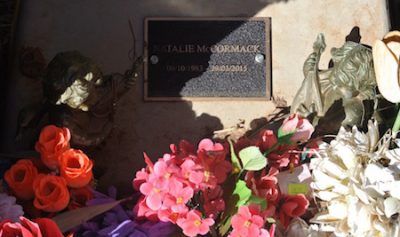Coroner refers case back to police and DPP
12 August 2016
Archived article
 By KIERAN FINNANE
By KIERAN FINNANE
Coroner Greg Cavanagh, at the conclusion of his inquest into “extreme domestic violence” in Alice Springs, declined to make a formal finding on who or what caused the stab wound that led to the death of N. McCormack on 29 March last year. He said he was of the belief that a crime had been committed and referred the case back to the Commissioner of Police and the Director of Public Prosecutions.
Counsel assisting, Kelvin Currie, summed up the evidence that had been placed before the court, noting the several explanations that key suspect Nathan Swan, Ms McCormack’s husband, had given for what happened – to the St John’s operator who took his 000 call, then to the ambulance officers who had tried to revive Ms McCormack, and to police who arrived on the scene to assist.
“What is clear is that the story changed. Even taking into account less than perfect memories or note taking by police, the story had changed from falling onto something sharp [as claimed during the 000 call], to arguing, and then to arguing and her stabbing herself.
“The versions are clearly inconsistent. Even accounting for shock and panic it is unlikely that a first hand witness to such an event would differ in those details.”
Mr Currie said Mr Swan appeared to be covering “the likely scenarios where he was at fault”, which provides another clue.
For example, to the police officer who arrested him for breach of his DVO, Mr Swan said Ms McCormack had phoned him and invited him home. (Evidence showed Ms McCormack had not responded to a text from him at 2.16am of the day she died and that when he tried to call at 2.39am there was no answer.)
Two months later, when Mr Swan was in prison and was giving fingerprints, he told the officer doing the job that he pulled the knife out of his wife’s leg. This was the first time he mentioned this. Mr Currie suggested that it was because he was “no doubt aware that his fingerprints were on the knife.”
Mr Currie said there is “not one scintilla of reliable evidence” that Ms McCormack stabbed herself.
“The family seek closure,” he said. “There can be no closure until either Nathan [Swan] explains what happened or he is tried in court in relation to her death. He appears not to wish to provide the explanation and so it can only be hoped that the justice system will resolve the issue.”
Counsel representing the Commissioner of Police, Jodi Truman, reiterated the commitment of police – as expressed in her testimony by Acting Assistant Commissioner Kate Vanderlaan – to further improvements in their responses to domestic violence in the NT that is of “epidemic” proportions.
New strategies will include the introduction of video cameras worn on the body of police officers attending disturbances. This will be rolled out this year, Commander Vanderlaan said yesterday.
A key benefit could be that the statement made by the victim on the scene, recorded on video, becomes part of the victim’s Evidence in Chief. Such initiatives, which would require legislative change, have been implemented in the ACT and NSW.
This could help reduce the victim’s trauma, especially in later having to give evidence in court in front of the offender, and as a contemporaneous account provide greater accuracy in what they say about the incident and the impact it had on them. It might also counter attempts by the victim to later minimise the perpetrator’s conduct or to blame themselves.
Accompanying the rollout, refresher training will be provided to officers, on the applicable law, police response to domestic and family violence matters, and issues such as hearsay evidence.
However police, Ms Truman said, are but one part of the puzzle. She said there is “a desperate need of a change in mindset” on the part of the whole community, Aboriginal and non-Aboriginal.
Mr Cavanagh said it is important for the police and the whole community to “not allow the scale of the problem to overwhelm them and us”.
He will hand down his formal findings in the coming weeks.


